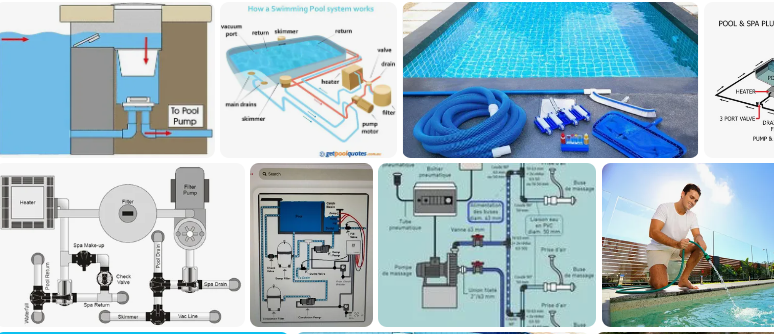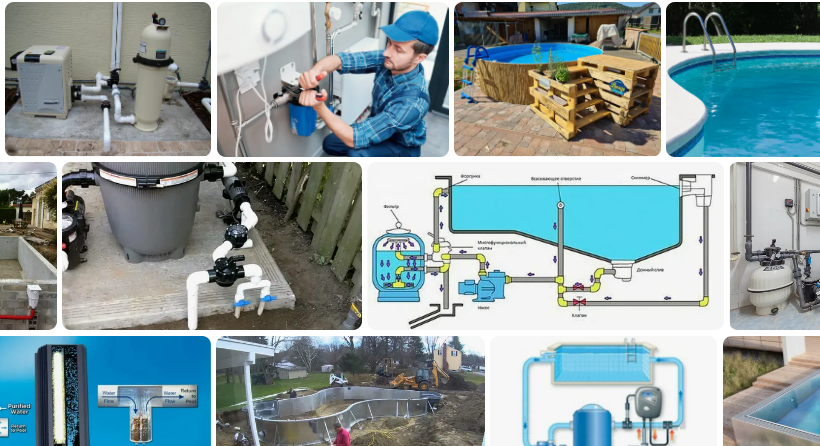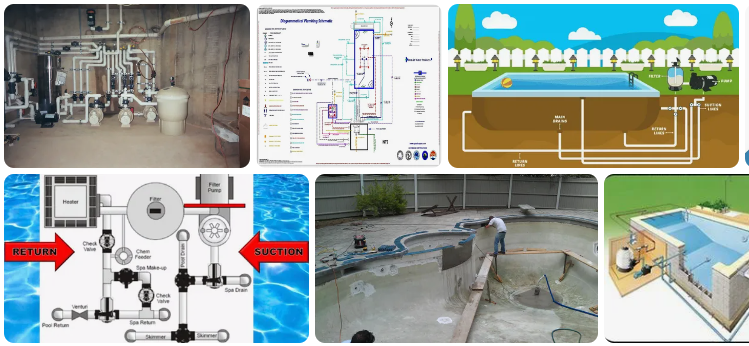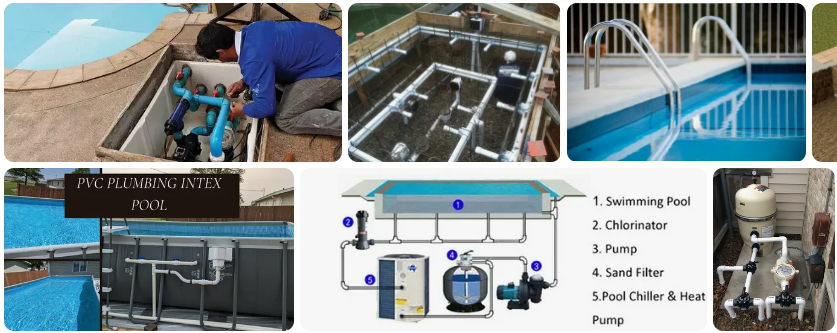Pool plumbing cost can significantly impact the overall maintenance expenses of your swimming pool. Whether you are dealing with leaks, malfunctioning pumps, or a complete pipe replacement, understanding the factors that affect these costs is crucial. Having an efficient plumbing system ensures your pool operates smoothly, reducing potential long-term issues.
Table of Contents
This article will explore the various elements contributing to pool plumbing costs, provide insights into common pool plumbing problems, and offer guidance on reducing your plumbing expenses without compromising quality. Whether you’re considering DIY repairs or hiring a professional, we’ll cover all aspects to help you make informed decisions about your pool’s plumbing system.
Factors Affecting Pool Plumbing Cost
Understanding the primary factors affecting pool plumbing cost is the first step in managing your expenses. These factors include the materials used, pool size, and the overall complexity of the plumbing system.
Pool Plumbing Cost: Material of the Pipes
One of the most significant factors that influence pool plumbing cost is the type of materials used for the pipes. Different pipe materials come with varying prices, durability, and maintenance requirements.
- PVC Pipes: PVC is a common material for pool plumbing due to its affordability, flexibility, and resistance to corrosion. However, PVC pipes may not last as long as other options and could require more frequent repairs. The average cost for PVC pipe replacement ranges from $5 to $15 per foot.
- Copper Pipes: More durable and resistant to corrosion, copper pipes are ideal for high-pressure applications, such as pool heaters and pumps. However, they come at a higher cost, typically ranging between $10 and $20 per foot. Copper pipes are also prone to theft in some areas, which could increase overall replacement costs.
- CPVC and Stainless Steel: CPVC pipes are similar to PVC but are more heat-resistant, making them suitable for heated pools. Stainless steel pipes are incredibly durable but are typically reserved for high-end pool installations due to their higher price tag, which can range from $20 to $30 per foot.
Choosing the right pipe material depends on your pool’s specific needs, your location, and your budget. PVC is often the go-to for most residential pools, while copper and stainless steel are better suited for commercial or luxury pools.
Pool Plumbing Cost: Pool Size and Layout
The size and layout of your pool also have a direct impact on the plumbing cost. Larger pools require more extensive piping systems, increasing both the material and labor costs. Additionally, pools with complex shapes or multiple water features, such as spas or waterfalls, require more plumbing lines, further increasing expenses.
For example, a standard 20 x 40-foot inground pool may have plumbing costs ranging from $7,000 to $10,000, while a pool with additional water features or an irregular shape can push the cost up to $15,000 or more.
Pool Plumbing Cost: Accessibility of Pool Plumbing
Accessibility plays a significant role in determining pool plumbing costs. If the plumbing is easily accessible, repair and replacement tasks are straightforward, reducing labor expenses. However, if the pipes are buried deep underground or located beneath concrete decking, excavation may be required. Swim Spa Cost article here..
Underground pool pipe repair costs can be substantial, often ranging from $2,500 to $5,000, depending on the extent of the excavation and the repairs needed. In contrast, above-ground pools tend to have lower plumbing costs because the pipes are easier to access and repair.
Common Pool Plumbing Problems and Costs

Swimming pool plumbing systems can encounter a variety of issues, each with its own cost implications. The most common problems include pool pump leaks, underground pipe leaks, and main drain repairs.
Pool Plumbing Cost: Pool Pump Leak Repair Cost
One of the most common pool plumbing issues is a leak in the pool pump. A pool pump leak typically stems from damaged seals, gaskets, or the pump’s housing. Pool pump leak repair costs can vary depending on the severity of the damage. On average, pool pump repairs range from $200 to $500. If the pump needs to be replaced entirely, the cost can increase to $800 to $1,300.
A leaking pool pump can cause reduced water circulation, leading to poor water quality and potentially costly damages to the pool’s filtration system. Therefore, addressing leaks as soon as they are detected is critical to keeping overall repair costs manageable.
Pool Plumbing Cost: Pool Leak Detection Price
Detecting a leak in your pool’s plumbing system can be challenging and often requires specialized equipment. Pool leak detection prices generally range from $100 to $500, depending on the method used. Professional services may involve pressure testing, dye testing, or the use of advanced electronic leak detection equipment.
Accurately locating a pool leak ensures that repairs are targeted and cost-effective, minimizing unnecessary excavation or pipe replacement.
Pool Plumbing Cost: Cost of Pool Pipe Replacement
In some cases, damaged or leaking pipes may need to be replaced entirely. The cost of pool pipe replacement depends on the type of pipe, the length of piping required, and the complexity of the installation. For an average-sized pool, pool pipe replacement costs range from $1,500 to $5,000, with more extensive projects costing up to $10,000 or more.
Underground pool pipe repair cost tends to be higher due to the additional labor involved in excavation. Above-ground pools, on the other hand, often have lower replacement costs, typically ranging from $1,000 to $3,000.
DIY vs. Professional Pool Plumbing Repair

Deciding whether to tackle pool plumbing repairs yourself or hire a professional can be a tough choice. While DIY repairs can save money upfront, they may not always be the best option, especially for more complex plumbing issues.
Pool Plumbing Cost: Benefits and Costs of DIY
Many pool owners are tempted to handle minor repairs themselves to save on labor costs. DIY pool plumbing repairs can be successful for simple tasks, such as replacing a leaky seal or unclogging a pipe. The cost of DIY repairs typically involves only the price of materials, such as replacement seals, fittings, or pipe sections, which can range from $20 to $200 depending on the scope of the repair.
However, DIY repairs come with risks. If the issue is misdiagnosed or improperly repaired, it can lead to more extensive (and expensive) damage down the road. Additionally, some repairs may require specialized tools or knowledge that homeowners may not have.
Pool Plumbing Cost: Why Hiring a Professional May Be Better
Hiring a professional pool technician for plumbing repairs provides peace of mind and ensures the job is done correctly. Professionals have the experience, tools, and knowledge needed to handle more complicated repairs, such as underground pipe replacements or major pool pump overhauls.
While professional services come with higher costs—ranging from $100 to $150 per hour—they often include warranties on parts and labor, which can save money in the long run. For complex jobs, such as detecting and repairing pool leaks, or replacing large sections of pipe, hiring a professional is usually the safer and more cost-effective option.
Ways to Minimize Pool Plumbing Costs

Keeping pool plumbing costs in check doesn’t have to be difficult. With a few proactive strategies, you can reduce your expenses and extend the lifespan of your pool’s plumbing system.
Pool Plumbing Cost: Regular Maintenance
Regular maintenance is key to preventing costly plumbing issues. Conducting routine inspections of your pool’s plumbing system, such as checking for leaks, inspecting pump seals, and cleaning filters, can help identify potential problems early on. Hiring a professional pool technician for an annual inspection typically costs between $100 and $300 but can save thousands in repair costs by addressing minor issues before they become major problems.
Pool Plumbing Cost: Seasonal Cost Considerations
Pool plumbing repair costs can fluctuate throughout the year, with prices often higher during the peak summer months due to increased demand. Scheduling repairs during the offseason (fall or winter) can help you save on labor costs and potentially get better rates on materials.
Pool Plumbing Cost: Comparison Shopping for Parts
Another effective way to reduce pool plumbing costs is to comparison shop for parts and materials. Whether you need a new pool pump, replacement pipes, or seals, checking prices at multiple retailers can help you find the best deal. Many online retailers offer discounts on pool equipment and parts, making it easier to find cost-effective options.
Conclusion
Understanding the various factors affecting pool plumbing cost allows you to make informed decisions about maintaining your swimming pool. From the type of materials used to the complexity of repairs, each element plays a role in determining your overall expenses. While DIY repairs can be a cost-effective option for minor issues, hiring a professional ensures that more complex tasks are completed correctly, preventing costly damage in the future.
By investing in regular maintenance and staying proactive about addressing plumbing issues early on, you can significantly reduce long-term expenses and enjoy a well-functioning pool for years to come.
FAQ Plumbing Pool Heat Pump Cost
1. What is the average cost of pool plumbing repairs?
The average cost of pool plumbing repairs ranges from $200 to $5,000, depending on the issue. Minor repairs, such as fixing a pool pump leak, cost between $200 and $500, while major repairs like underground pipe replacements can reach $5,000 or more.
2. How much does it cost to replace pool pipes?
The cost to replace pool pipes depends on the type of pipe and the pool’s size. Typically, it ranges from $1,500 to $5,000 for residential pools. For larger pools or those with complex systems, costs may exceed $10,000.
3. What factors influence pool plumbing cost the most?
The main factors that influence pool plumbing costs include the material of the pipes (PVC, copper, etc.), the size and shape of the pool, and the accessibility of the plumbing system. Underground pipe repairs are typically more expensive due to excavation.
4. Is it cheaper to repair or replace pool plumbing?
In general, minor repairs such as fixing leaks or replacing gaskets are more affordable than replacing the entire plumbing system. However, if pipes are significantly damaged or corroded, replacement may be more cost-effective in the long run.
5. How often do pool pipes need to be replaced?
Pool pipes, especially those made of PVC, can last 10-20 years with proper maintenance. Copper and stainless steel pipes tend to last longer, often exceeding 30 years. Regular inspections and maintenance can extend the lifespan of the pipes.
6. Can I do pool plumbing repairs myself?
DIY pool plumbing repairs are possible for simple tasks like replacing seals or fittings. However, more complex repairs, such as underground pipe replacements or pool leak detection, typically require professional assistance to avoid further damage.
7. How much does pool leak detection cost?
Pool leak detection costs range from $100 to $500, depending on the method used. Pressure testing, dye testing, and electronic leak detection are common techniques used by professionals to locate leaks in the plumbing system.
8. Why are underground pool pipe repairs more expensive?
Underground pool pipe repairs are more expensive because they involve excavation to access the pipes. This increases labor costs and can also involve repairing or replacing decking or landscaping that was disturbed during the process.
9. What are some signs of plumbing problems in a pool?
Common signs of pool plumbing problems include low water pressure, air bubbles in the water, noticeable drops in water levels, unusual noises from the pool equipment, or visible cracks in the pool’s plumbing system.
10. How can I reduce pool plumbing costs?
You can reduce pool plumbing costs by performing regular maintenance, scheduling repairs during the offseason when demand is lower, and comparison shopping for parts and materials. Regular inspections can also help catch small issues before they become expensive problems.
